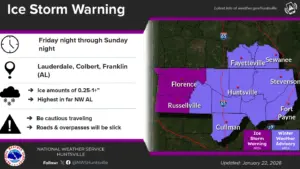Truancy affects student success long-term
Behind every struggling student, there’s often a family that needs support.
Truancy — unexcused absences from school — can range from occasional missed days to chronic absenteeism that points to deeper problems.
When students start missing school or showing signs of trouble, the Helping Families Initiative works to ensure they don’t face those challenges alone. HFI steps in to find out what’s causing the absences and takes steps to help get the students back on track.
Members of the GFWC Book Lovers Study Club learned more about this effort during their October meeting.
Franklin County District Attorney Jeff Barksdale and program Coordinator Mandy Cummings explained how the initiative operates locally and how it helps children across the county.
Cummings directs and organizes the Helping Families Initiative for the 34th Judicial Circuit District Attorney’s Office.
She explained absences may be excused for reasons including illness, death in the immediate family, prior permission from the principal, inclement weather, quarantine and other emergency conditions.
Parents or doctors must provide a written excuse within three days of a student’s return for the absence to count as excused.
Cummings added the effects of truancy show in the numbers: Students who miss 15 to 19 days of school have only a 21% chance of graduating.
Two-thirds of students who are truant will not graduate and often face criminal charges within two years.
Research shows students who are chronically truant are 12 times more likely to commit a serious assault and 21 times more likely to commit a serious property crime.
The program partners with Russellville City Schools, Franklin County Schools, the Alabama Legislature and Volunteers of America– Southeast.
The initiative aims to improve attendance, grades and family stability while reducing dropouts, juvenile arrests, and safety concerns. The program works to determine the reasons behind chronic absenteeism or behavioral problems and connects families with local resources that can help.
Families can get referrals through a child’s school, or by contacting the district attorney’s office.
Team members meet with each family and link them with organizations including Riverbend, Health Connect, Community Action and Faith Mission.
Mandy Cummings addresses the GFWC Book Lovers Study Club about the Helping Families Initiative.
Club President Gayle McAlister thanked Barksdale and Cummings for sharing details about the program and the ways it serves local families.
In other business. Ponda Gordon presented the club’s Institute. She highlighted early results of the Alabama FOCUS Act, which limits phone use during the school day except for educational purposes, emergencies or medical plans.
She said many educators report improved focus and academic performance when phones stay out of classrooms. Gordon said teachers also note better concentration and more engagement, and many students say they feel less anxious.
Patricia Cox, chairman of the annual Walk-to-Wellness project, distributed committee assignments with members handling T-shirts, registration, publicity, route, water and finish, encouragement, trophies and decorating, and trophy presentation.
McAlister reported on the GFWC International National Day of Service, “A World Without Violence.”
She recognized Stephanie Mayfield for presenting a women’s self-defense program. The project raised $145 for the SafePlace Survivor Scholarship.
The group met in the green room of Russellville First Baptist Church with Brenda Oliver and Sharmaine Fikes serving as hostesses.
Members approved minutes and the treasurer’s report and voted to donate $50 toward decorations for the GFWC Southern Region meeting in Huntsville.
The meeting closed with the reading of the “Collect.”







